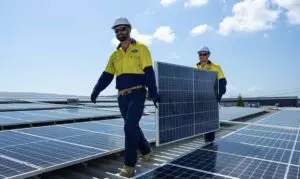Shortly after Victoria announced it would ban gas connections to newly built homes, new NSW Premier Chris Minns was bailed up by 2GB’s Ben Fordham on the topic and hurriedly declared he would “not pursue” a ban on gas in new homes.
More recently, on the Renew Economy SwitchedOn podcast, assistant energy minister Jenny McAllister declared that the federal government would not be limiting consumer choice.
Certain commentators in various countries have insisted that householders need the “freedom of choice” to use gas appliances, and that gas connection bans would remove that freedom.
But let’s look at it another way. Burning gas produces toxic byproducts known to be harmful to human health including carbon monoxide, nitrogen dioxide, formaldehyde and the carcinogen benzene. Doing so indoors is equivalent to having a smoker in the house.
So spare a thought for householders who want the freedom to choose electric appliances for health or other reasons, but cannot do so because gas is what has been installed in their home.
People wishing to electrify an existing home, even if they plan to replace old gas appliances as they break, can face big purchase and installation costs, sometimes including the cost of an electrician to wire additional circuits.
Sometimes this necessitates upgrading or expanding the switchboard. If your home has a concrete slab floor and masonry or concrete walls, it becomes extremely difficult to discreetly cable a new circuit for a stove or oven without winding up with a surface mounted electrical conduit.
For these reasons, a gas to electric appliance swap is not an apples for apples exercise. And that is denying freedom of choice, as well as needlessly creating suffering and clogging our health system with wholly avoidable respiratory and other conditions.
If governments are to shy away from gas connection bans for fear of limiting choice, perhaps they should enable genuine freedom of choice, by ensuring that if a new home is to be gas connected, it is also ready for electric appliances at each location a gas appliance is to be installed.
Cooking is fairly straightforward – a dedicated, minimum 40 Amp electrical socket would need to be provided in the kitchen, next to each gas connection used by a range or stove top.
Heating is an interesting case. From a property developer’s perspective, if you’re installing air conditioning, these days it’s difficult to find a unit that doesn’t provide a reverse cycle (RCAC) heating function.
As long as the home is well insulated and sealed (which it must be to meet the minimum seven star energy efficiency requirement), use of RCAC for heating should provide a comfortable and cost effective outcome for occupants.
Now some householders like the look of a wall mounted gas heater with the appearance of a log fire. No problem: as long as the reverse cycle system can effectively heat the area, an owner could, in the future replace it with an electric “faux flame” unit that can plug into the 10 Amp electrical socket typically used by the gas heater’s fan and piezo starter.
Such units can even give off a bit of heat (equivalent to a normal bar or portable fan heater) – not especially efficient, but fine to add a cosy fireside atmosphere supplemented by the RCAC.
Barbecue? Patio heaters? Again, suitable electrical circuits wherever gas is proposed to be supplied.
Finally, hot water. Again, providing a dedicated power circuit suitable for a future electric system next to a gas system would be the minimum requirement.
There are a few caveats. For example, if instantaneous gas is used, the small form factor may see it installed in a location unsuitable to the later replacement of a tank-based electric system (either heat pump or resistive). If installed inside, the location of the gas system may not be well suited to a heat pump system that requires an outdoor compressor.
Suitable guidance would need to be provided to ensure consumers were not denied freedom to choose their preferred technology upon replacement.
But what’s that you’re thinking? Wouldn’t provision of duplicate electrical infrastructure alongside gas add to the costs of a new home build? Certainly, but this is all about satisfying demands for choice!
Of course, an easier approach – short of a gas connection ban, which could be justified on any one of health, climate, or economic grounds – would be to ensure that efficiency performance standards in tools such as NSW’s BASIX or the National Construction Code are progressively tightened to the point that most gas appliances simply aren’t viable anymore, given their inferior energy efficiency or greenhouse gas performance.
In fact, that sounds a little like the anticipated operation of the New Vehicle Efficiency Standards, which we’re told is going to be good for choice.
David McEwen is a director at Adaptive Capability, providing climate risk and net-zero emissions (NZE) strategy, program and project management. He works with businesses, community leaders, policy makers, designers and engineers to deliver impactful change. His book, Navigating the Adaptive Economy, was released in 2016.







